A selection of articles on Iraq from the past week.
Moqtada al-Sadr calls for end to Iraq clashes
Telegraph (UK)
March 31, 2008
Moqtada al-Sadr, the radical Shi'ite leader, has ordered his followers to abandon a week-old uprising that humbled Iraq's government by exposing its tenuous grip on the country's biggest cities.
Iraq unhappy with Arab summit resolutions
Reuters
March 30, 2008
Iraq criticized fellow Arabs for not expressing support for its U.S.-backed government at an Arab summit that concluded in the Syrian capital on Sunday.
Anger as 50 Iraqi refugees are sent back
Guardian (UK)
March 30, 2008
They were deported to Irbil in northern Iraq. The British government claims the region is safe, but human rights campaigners warn it is becoming increasingly dangerous. It has emerged that one failed asylum seeker, Solyman Rashid, who was returned from Britain after his appeal was rejected, was killed by a car bomb in Kirkuk, northern Iraq, last September.
Bad Judgment: Labeling a close U.S. ally a terrorist organization, Immigration leaves a dedicated Iraqi translator in limbo
Washington Post
March 27, 2008
IT'S HARD to imagine a refugee from Iraq more deserving of residence in the United States than Saman Kareem Ahmad. The 38-year-old Kurd lost his family during Saddam Hussein's genocidal chemical attack against his home town of Halabja in 1988; for the last several years, his de facto family has been the U.S. Marine Corps, for which he bravely served as a translator in Fallujah. Driven out of Iraq by death threats in 2006, he was admitted to the United States under a special visa program for translators and granted asylum. He now provides instruction for Marines headed to Iraq from the base in Quantico.
Patriots, Refugees, and Terrorists
Findlaw Legal News and Commentary
March 26, 2008
In recent months it has become clear that, despite the changes in the terms of the law, the Department of Homeland Security is continuing to bar refugees who should benefit from the expanded waiver authority. These people have fled their countries to escape persecution, and they're being told that they're terrorists. What is going on?
Iraq war disappearing in US media
Associated Press
March 25, 2008
With slugfest for the White House going on and an economy that is plummeting toward recession, there is less and less interest in news, positive or negative, from Iraq, where US soldiers have been fighting since March 20, 2003.
FACTBOX-Main players in Iraq's Basra
Reuters
March 25, 2008
Two powerful factions of Iraq's Shi'ite majority, the Supreme Islamic Iraqi Council and the Mehdi Army militia of Moqtada al-Sadr, are fighting for power in Basra along with a smaller Shi'ite party, Fadhila.
We've Moved!
Monday, March 31, 2008
Thursday, March 27, 2008
Iraqis in Jordan: a Picture of Instability
![An Iraqi student overlooking the densely-populated urban landscape in East Amman, Jordan. [photo: Emily Stivers, 2-28-08]](http://2.bp.blogspot.com/_2-Ct1a3ucJI/R-uVhd5XHRI/AAAAAAAAAOU/Bsg78dRkpy0/s320/100_0495.jpg) Since 2003, violence has displaced up to 4.5 million Iraqis (roughly 17 percent of the Iraqi population). Approximately half are internally displaced, while the rest have fled to neighboring countries. The number of Iraqis currently living in Jordan, however, is difficult to determine, as newly-arrived Iraqis disappear into the Hashemite Kingdom's densely-populated cities.
Since 2003, violence has displaced up to 4.5 million Iraqis (roughly 17 percent of the Iraqi population). Approximately half are internally displaced, while the rest have fled to neighboring countries. The number of Iraqis currently living in Jordan, however, is difficult to determine, as newly-arrived Iraqis disappear into the Hashemite Kingdom's densely-populated cities.Working in collaboration with the Jordanian Department of Statistics and the United Nations Population Fund (UNFPA), the Norwegian Research Institute, Fafo –- an independent polling organization –- estimated there were between 450,000-500,000 Iraqi residents in Jordan as of May 2007, whereas Jordan had previously maintained there were about 750,000 Iraqis and the United Nations High Commissioner for Refugees (UNHCR) had set the number as high as one million. The reason for this discrepancy lies in part in the ambiguous nature of the problem: Iraqis living in Jordan are difficult to count, find and survey because many live in fear and are hiding from authorities.
![Iraqis line up for basic health services at a Jordanian Red Crescent clinic in East Amman. [photo: Emily Stivers, 2-28-08]](http://2.bp.blogspot.com/_2-Ct1a3ucJI/R-uWCd5XHSI/AAAAAAAAAOc/6xqLO1hrpiA/s320/100_0503.jpg) Every Iraqi interviewed by the International Organization on Migration in Jordan reports experiencing trauma in Iraq, from street bombings and drive-by shootings to more personal crimes such as jarring death threats, rape, or the murder of a loved one. Such experiences make Iraqis nervous about the prospect of being found by those who targeted them in Iraq, or of forced deportation by the Jordanian government. Legitimate or not, these fears make Iraqis less likely to respond to inquiries or to volunteer information, which makes their numbers -– and their needs -– extremely difficult to pinpoint.
Every Iraqi interviewed by the International Organization on Migration in Jordan reports experiencing trauma in Iraq, from street bombings and drive-by shootings to more personal crimes such as jarring death threats, rape, or the murder of a loved one. Such experiences make Iraqis nervous about the prospect of being found by those who targeted them in Iraq, or of forced deportation by the Jordanian government. Legitimate or not, these fears make Iraqis less likely to respond to inquiries or to volunteer information, which makes their numbers -– and their needs -– extremely difficult to pinpoint.However, data from Fafo and other independent studies provide at least a vague picture of the Iraqi population in Jordan. Assuming the lower Fafo numbers, at least 1 in 14 people in Jordan (which has a population of about 5.63 million) are displaced Iraqis. As of mid-February 2008, UNHCR had registered 52,192 Iraqis in Jordan, with almost 90 percent originating from Baghdad and most of the rest from Iraq's southern provinces. According to the Fafo study, Iraqi refugees in Jordan are about 55 percent male and 45 percent female. In addition, an estimated 15 percent of Iraqis in Jordan have special needs or are at risk (this includes people with medical needs, children, adolescents and women at risk, the disabled and the elderly).
Unable to legally work in Jordan, Iraqis who came to the country with middle class standing have since become impoverished as their savings run dry. Most have settled in crowded and decaying apartments in poor urban neighborhoods, and are becoming increasingly destitute and desperate.
So why should the U.S. care?
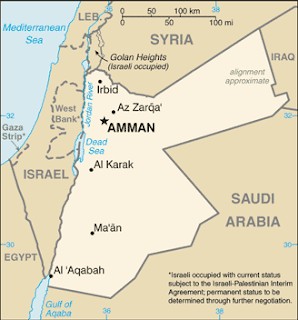 As the sixth largest recipient of U.S. aid, Jordan’s stability is of paramount concern to U.S. policymakers. Jordan -– a country bordered by Iraq, Israel, Saudi Arabia, Syria and the West Bank –- is considered one of the stabilizing countries in the Middle East and a moderate voice amongst Arab nations. To this end, Jordan works to meet the needs of all Arabs in hardship, including its substantial Palestinian refugee population, and is one of only two Arab countries to recognize Israel.
As the sixth largest recipient of U.S. aid, Jordan’s stability is of paramount concern to U.S. policymakers. Jordan -– a country bordered by Iraq, Israel, Saudi Arabia, Syria and the West Bank –- is considered one of the stabilizing countries in the Middle East and a moderate voice amongst Arab nations. To this end, Jordan works to meet the needs of all Arabs in hardship, including its substantial Palestinian refugee population, and is one of only two Arab countries to recognize Israel.Jordan’s geopolitical position in the Middle East makes the country a crucial component of U.S. global military strategy in the region under the Central Command, and an important front in the global war on terror. Jordan has played a particularly pivotal role in supporting the restoration of stability and security to Iraq by training Iraqi police cadets at Jordanian facilities and by encouraging reconciliation of the Iraqi government. A stable, functioning Jordan is therefore critical to regional and international stability, and continued strong relations between the United States and Jordan are key to Jordan’s moderate policies and stability.
As the Arab-Israeli-Palestinian conflict attests, instability often follows large numbers of displaced people. In Jordan, the burden of caring for hundreds of thousands of Iraqis is heavy, straining the country's resources and capacity and increasing friction between Jordanians, Palestinians and Iraqis forced to compete for basic needs. This threat to Jordan’s stability is also a threat to U.S. interests, and the United States must play an important role by either fostering stability through aid and regional leadership, or allowing that stability to deteriorate.
Tuesday, March 25, 2008
What Should YOU Do About Iraq?
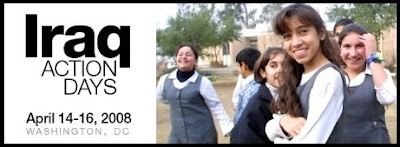.jpg)
Come to Washington, D.C. this April to urge Congress to respond to one of the greatest humanitarian crises of our time. Millions of Iraqis have been uprooted by violence. Families need food, medicine and shelter.
It’s time for action. It’s time for Iraq Action Days, April 14 - 16.
On Monday, April 14, the Institute for Middle East Studies at George Washington University will host an all-day Iraq Forum, sponsored by EPIC and more than 20 humanitarian organizations including those operating inside Iraq and in the Middle East region. Then on Tuesday, April 15, and Wednesday, April 16, we will meet with lawmakers to urge them to do more to address urgent humanitarian needs of the Iraqi people.
OUR GOALS:
♦ Strengthen humanitarian assistance to the region.
♦ Increase support for reconciliation, recovery, and community-based development in Iraq.
♦ Improve U.S. admissions and resettlement of especially vulnerable refugees.
Last year, thousands of EPIC members helped significantly increase U.S. emergency humanitarian assistance to the region. They also helped us pass Senator Kennedy's "Refugee Crisis in Iraq Act," which requires the Bush administration to expand U.S. admissions of especially vulnerable Iraqi refugees and provide a comprehensive action plan for addressing the crisis.
This April, we need supporters like you to come to Washington, D.C. to petition our elected leaders directly. Right now, Congress and the administration must take further steps to respond to the urgent needs of Iraqis affected by ongoing violence in Iraq. The first step begins with you.
It’s time for action. It’s time for Iraq Action Days, April 14 - 16.
Monday, March 24, 2008
Iraq Headlines 3/24/08
A selection of articles on Iraq from the past week.
The Private Sector’s Tramping in Iraq
New York Times
March 24, 2008
As the nonpareil war profiteer in Iraq, Blackwater Worldwide keeps outdoing its own mercenary record.
Iraq Plans Oil, Gas Development Projects
Associated Press
March 23, 2008
Iraq's Oil Ministry said Sunday that it has invited local and international oil companies to bid for contracts including one to develop a natural gas field in a Sunni area in the western part of the country.
US rebuked over Iraqi refugees
Press TV (Iran)
March 23, 2008
The US accepts a small number of Iraqis with refugee status despite the poor living conditions in the country, a top rescue committee says.
 Rep. Waters Leads Letter to Bush Expressing Concern Over Plight of Displaced Iraqis
Rep. Waters Leads Letter to Bush Expressing Concern Over Plight of Displaced Iraqis
Press Release from Congresswoman Maxine Waters
March 20, 2008
Rep. Waters said, “This letter sends a strong message that Congress is committed to addressing the humanitarian crisis confronting Iraqi refugees and internally displaced persons. The displacement crisis will get worse if ignored and we look forward to the President’s support as we work to address this issue.”
Iraq at Five: The Refugee Crisis
Washington Post
March 20, 2008
Refugees International senior advocate Kristele Younes, who recently returned from checking conditions in Syria, was online Thursday, March 20 at 2 p.m. ET to take questions about the people forced out of their homes by the conflict in Iraq and what needs to be done.
Too deadly to return home, refugees say
Agence France-Presse
March 20, 2008
Five years after the U.S.-led invasion, Iraq's hundreds of thousands of refugees remain unconvinced that security has improved sufficiently for them to return home, even though life has grown more difficult in their countries of asylum.
War Victims Fund Aids Innocents
Associated Press
March 20, 2008
His last surgery, performed in October in Jordan, managed to halt the infection. The cost was covered by the war victims fund, named for Marla Ruzicka, an American humanitarian activist killed by a roadside bomb in Iraq in 2005.
Ottawa to double Iraqi refugees accepted this year
The Star (Canada)
March 20, 2008
Canada intends to accept more than double the number of refugees from Iraq this year, says Citizenship and Immigration Minister Diane Finley. Canada will raise its Middle East resettlement target to 3,000 people this year, up 54 per cent from 2007, Finley said.
Turmoil of Iraq War sparks surge in EU asylum applications
The Guardian (UK)
March 19, 2008
The number of Iraqis applying for asylum across the EU almost doubled last year, rising from 19,375 to 38,286, reflecting the growing chaos in the country, UN figures released yesterday showed.
The untold story of Iraq's refugee crisis
Reuters
March 19, 2008
This kind of coverage in the mainstream media, running alongside a set of preoccupations which include the effectiveness of the "surge" of U.S. troops, the progress of the Iraqi parliament and the fall of sectarian violence, seems to give voice to an underlying desire that western involvement in Iraq - embarrassing as it has been - is in the process of ending. Yet, as those in the aid world are all too aware, a humanitarian story of gigantesque proportions has been building for some time, with 2 million Iraqi refugees living in empty buildings and makeshift camps in foreign lands, and a further 2.5 million internally displaced within Iraq.
On the Trail of the Rebuilding Story, Littered With Broken Parts
New York Times
March 19, 2008
We started chasing the reconstruction story, which I had imagined, as I bought those boots at Harry’s, would be a story of great engineers and heroic workers, something like the building of the Brooklyn Bridge in a war-torn Middle Eastern country: the Roeblings on the Tigris. Instead we found an infrastructure so decrepit, smashed and oversubscribed after decades of war and neglect that nothing the American engineers did, with billions of dollars at their disposal, seemed to work.
Commentary: Five Years Later, News From Iraq Not All Bad
Radio Free Europe
March 19, 2008
Politics is a dirty business anywhere in the world, but Iraqi politics today rank among the most divisive. While much has been written about Iraq since 2003 -- the early mistakes that continue to impede progress, the bitter rivalries that leave so many innocents dead, the roles of superpowers and neighbors -- few observers have offered a far-sighted view of the state of affairs.
Arab countries hosting Iraqi refugees appeal for more assistance
International Herald Tribune
March 18, 2008
Arab countries urged the international community Tuesday to provide them with more financial assistance to deal with the influx of Iraqi refugees fleeing the violence in their war torn homeland.
Situation of Palestinians on Iraq-Syria border continues to deteriorate
Briefing notes from UNHCR
March 18, 2008
The situation of more than 2,700 Palestinians who have been stranded and are living in inhumane conditions in two border camps at the Iraq-Syrian border continues to deteriorate.
The Private Sector’s Tramping in Iraq
New York Times
March 24, 2008
As the nonpareil war profiteer in Iraq, Blackwater Worldwide keeps outdoing its own mercenary record.
Iraq Plans Oil, Gas Development Projects
Associated Press
March 23, 2008
Iraq's Oil Ministry said Sunday that it has invited local and international oil companies to bid for contracts including one to develop a natural gas field in a Sunni area in the western part of the country.
US rebuked over Iraqi refugees
Press TV (Iran)
March 23, 2008
The US accepts a small number of Iraqis with refugee status despite the poor living conditions in the country, a top rescue committee says.
 Rep. Waters Leads Letter to Bush Expressing Concern Over Plight of Displaced Iraqis
Rep. Waters Leads Letter to Bush Expressing Concern Over Plight of Displaced IraqisPress Release from Congresswoman Maxine Waters
March 20, 2008
Rep. Waters said, “This letter sends a strong message that Congress is committed to addressing the humanitarian crisis confronting Iraqi refugees and internally displaced persons. The displacement crisis will get worse if ignored and we look forward to the President’s support as we work to address this issue.”
Iraq at Five: The Refugee Crisis
Washington Post
March 20, 2008
Refugees International senior advocate Kristele Younes, who recently returned from checking conditions in Syria, was online Thursday, March 20 at 2 p.m. ET to take questions about the people forced out of their homes by the conflict in Iraq and what needs to be done.
Too deadly to return home, refugees say
Agence France-Presse
March 20, 2008
Five years after the U.S.-led invasion, Iraq's hundreds of thousands of refugees remain unconvinced that security has improved sufficiently for them to return home, even though life has grown more difficult in their countries of asylum.
War Victims Fund Aids Innocents
Associated Press
March 20, 2008
His last surgery, performed in October in Jordan, managed to halt the infection. The cost was covered by the war victims fund, named for Marla Ruzicka, an American humanitarian activist killed by a roadside bomb in Iraq in 2005.
Ottawa to double Iraqi refugees accepted this year
The Star (Canada)
March 20, 2008
Canada intends to accept more than double the number of refugees from Iraq this year, says Citizenship and Immigration Minister Diane Finley. Canada will raise its Middle East resettlement target to 3,000 people this year, up 54 per cent from 2007, Finley said.
Turmoil of Iraq War sparks surge in EU asylum applications
The Guardian (UK)
March 19, 2008
The number of Iraqis applying for asylum across the EU almost doubled last year, rising from 19,375 to 38,286, reflecting the growing chaos in the country, UN figures released yesterday showed.
The untold story of Iraq's refugee crisis
Reuters
March 19, 2008
This kind of coverage in the mainstream media, running alongside a set of preoccupations which include the effectiveness of the "surge" of U.S. troops, the progress of the Iraqi parliament and the fall of sectarian violence, seems to give voice to an underlying desire that western involvement in Iraq - embarrassing as it has been - is in the process of ending. Yet, as those in the aid world are all too aware, a humanitarian story of gigantesque proportions has been building for some time, with 2 million Iraqi refugees living in empty buildings and makeshift camps in foreign lands, and a further 2.5 million internally displaced within Iraq.
On the Trail of the Rebuilding Story, Littered With Broken Parts
New York Times
March 19, 2008
We started chasing the reconstruction story, which I had imagined, as I bought those boots at Harry’s, would be a story of great engineers and heroic workers, something like the building of the Brooklyn Bridge in a war-torn Middle Eastern country: the Roeblings on the Tigris. Instead we found an infrastructure so decrepit, smashed and oversubscribed after decades of war and neglect that nothing the American engineers did, with billions of dollars at their disposal, seemed to work.
Commentary: Five Years Later, News From Iraq Not All Bad
Radio Free Europe
March 19, 2008
Politics is a dirty business anywhere in the world, but Iraqi politics today rank among the most divisive. While much has been written about Iraq since 2003 -- the early mistakes that continue to impede progress, the bitter rivalries that leave so many innocents dead, the roles of superpowers and neighbors -- few observers have offered a far-sighted view of the state of affairs.
Arab countries hosting Iraqi refugees appeal for more assistance
International Herald Tribune
March 18, 2008
Arab countries urged the international community Tuesday to provide them with more financial assistance to deal with the influx of Iraqi refugees fleeing the violence in their war torn homeland.
Situation of Palestinians on Iraq-Syria border continues to deteriorate
Briefing notes from UNHCR
March 18, 2008
The situation of more than 2,700 Palestinians who have been stranded and are living in inhumane conditions in two border camps at the Iraq-Syrian border continues to deteriorate.
Friday, March 21, 2008
What should Clinton, McCain or Obama do about Iraq?
 According to an open letter from the Brookings-Bern Project on Internal Displacement's Senior Fellow Elizabeth Ferris, a whole lot.
According to an open letter from the Brookings-Bern Project on Internal Displacement's Senior Fellow Elizabeth Ferris, a whole lot.One of the current presidential candidates -- either Hillary Clinton, John McCain or Barack Obama -- will eventually have to deal with the humanitarian crisis in Iraq and its spillover into neighboring countries. Jordan and Syria, both fragile states to begin with, now host a combined total of over 2 million Iraqis. Iraq, an even more fragile state, contains about 2.5 million people uprooted from their homes and traumatized by violence in their own country. According to the letter from Ferris:
Even in the best of cases — security improves, coalition forces are drawn down, Iraqi military capacity is strengthened — there will still be almost five million Iraqi refugees and internally displaced persons (IDPs) who will need your help to find solutions. If they don’t find solutions — if they remain homeless, jobless, destitute, and vulnerable to abuse and exploitation — the ramifications will be widespread for Iraq and for the region. And if the conflict takes a turn for the worse — which could happen if the al-Sadr ceasefire is revoked, or the Sunni awakening subsides, or the Concerned Local Citizens turn into independent militias — the humanitarian crisis could deteriorate dramatically. If this should happen, the political and security situation will inevitably worsen.Indeed, the Iraqi humanitarian crisis is going to be a huge problem confronting the next President. Will he or she choose to look the other way, as our current President has, or protract the same old tired argument over whether the 2003 Iraq invasion should have happened instead of owning up to our responsibilities to the victims of that invasion?
The Brookings-Bern letter is full of great ideas on how the next President should handle this crisis. First and foremost, the letter instructs, BE A LEADER. Acknowledge the U.S. role in creating the problem. Make clear that the U.S. has a responsibility to the victims of this war. Make a strong commitment to responding to the humanitarian needs of Iraqis, and follow through on that commitment.
Why? Addressing the humanitarian crisis is the right thing to do. It will help re-establish U.S. moral standing in the international community. It will take a step toward repairing the damaged U.S. reputation in the Muslim world. It will indicate a change from the previous administration — a change which will potentially benefit millions of people. Without presidential leadership at this critical juncture, the likely consequences for your Iraq policy and for Middle East peace and stability are dire.The letter goes on to outline specific policy recommendations the next President ought to consider: establishing an Iraq Humanitarian Czar with Presidential access, broadening inter-agency collaboration, working through multilateral channels, developing humanitarian benchmarks. For the full read (and it's a good one), click here. But, the letter concludes, the most important thing for the next President to do is SOMETHING: "at the least, I hope that you will think about the issues, and perhaps be inspired to take different steps to address the underlying humanitarian and security problems." The next President needs to think about this problem, acknowledge it, and take action.
We're working to make sure the candidates get the message.
Thursday, March 20, 2008
Five-Year Iraq Conflict Has Caused Massive Refugee Crisis; IRC Commission Calls U.S./World Response ‘Grossly Inadequate’
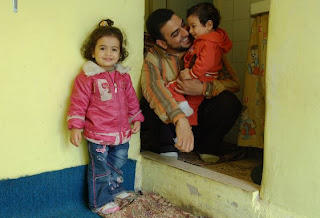 press release from the International Rescue Committee (IRC)
press release from the International Rescue Committee (IRC)The U.S.-led invasion of Iraq five years ago and its violent aftermath have produced one of the largest humanitarian crises of our time, yet the “Coalition of the Willing” has been mostly unwilling to own up to it and provide adequate aid for the innocent bystanders.
More than four million Iraqi civilians are estimated to be uprooted by horrific violence and in dire need of help in a crisis that is largely hidden from the public and ignored by the international community, according to a report issued today by the International Rescue Committee’s Commission on Iraqi Refugees. The report, “Five Years Later, a Hidden Crisis,” is available here.
The report comes after an IRC Commission trip in February to refugee-inundated Syria and Jordan to examine the worsening crisis and seek ways to expedite aid and resettlement. The delegates met with Syrian President Bashar al Assad and other Syrian, Jordanian, Iraqi, U.S. and U.N. officials, along with dozens of Iraqi refugees.
“Neither the U.S. nor the rest of the world is paying sufficient heed to the crisis,” the report states, adding that help offered by the U.S., primarily, as well as other international and regional donors, has been paltry and halfhearted.
The IRC Commission found that already bleak conditions for hundreds of thousands of Iraqi refugees in Syria and Jordan are growing worse by the day. Most live in dilapidated and congested apartments in poor urban areas. They are running out of money, because they are not permitted to work, and can no longer afford the basics, like rent, heat and food. They are getting sick or suffer chronic illnesses, but have limited access to medical care. They are severely traumatized by the violence they witnessed, endured and fled. They suffer deep despair because of lost homes, livelihoods and loved ones. They worry incessantly about the fate of their children and the safety of relatives displaced or trapped by violence in Iraq. They are anxious about their uncertain future.
The commissioners point out that the majority of Iraqi refugees are educated, had decent jobs and were leading middle class lives in Iraq, but that most are now destitute. “The chasm between where they were and where they are now is deep and wide,” they say.
Contrary to media reports that indicate refugees are repatriating because of improved safety in Iraq, all Iraqis in Syria and Jordan queried by the commission found unimaginable the prospect of returning any time soon to ruined and occupied homes in still-volatile communities.
The IRC Commission believes that the United States Government has a special responsibility to aid Iraqis and significantly address a humanitarian crisis that it had a role in creating. However, the U.S. cannot do it alone. The delegates say the scale of the humanitarian emergency requires a significant international response and that Europe and Arab states, including Iraq, should and can be doing much more. “It is both a humanitarian and political imperative,” they assert.
For IRC's recommendations and the full text of the press release, click here.
Wednesday, March 19, 2008
Headlines 3/19/08
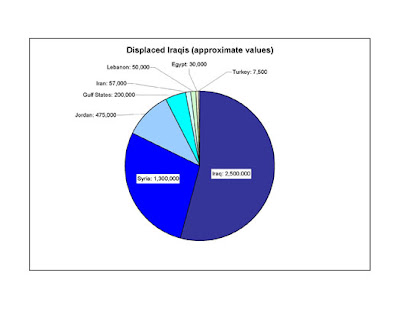 Jordan appeals for more aid to help Iraq refugees
Jordan appeals for more aid to help Iraq refugeesAssociated Press
March 18, 2008
Jordan appealed on Tuesday for more aid to assist neighbouring countries sheltering hundreds of thousands of Iraqi refugees uprooted by war, saying the solution lies in their return home.
Despite US troop surge, number of Iraqi refugees in EU nearly doubled in 2007
International Herald Tribune
March 18, 2008
Record numbers of Iraqis sought asylum in the European Union in 2007, according to statistics released Tuesday, despite a sharp reduction in violence in their country that followed the surge of U.S. forces.
Clinton Says Iraq Surge Hasn't Accomplished Goals
Washington Post
March 17, 2008
Sen. Hillary Rodham Clinton said that the increase in U.S. troops in Iraq over the last year has "not accomplished its goals" in a speech this morning touting her plans to end the war in Iraq and criticizing the war positions of President Bush, John McCain and Barack Obama.
Cheney Visits Iraq and Reaffirms Support
Associated Press
March 17, 2008
Cheney, who was in Iraq 10 months ago, said the Iraqis have made legislative advances that would be vital to the country's future. He also said there was no question but there had been a dramatic improvement in security.
Red Cross: Humanitarian situation still critical in Iraq
China View
March 17, 2008
"Better security in some parts of Iraq must not distract attention from the continuing plight of millions of people who have essentially been left to their own devices," said Beatrice Megevand Roggo, the ICRC's head of operations for the Middle East and North Africa.
Iraq, 5 Years On, A Nation of Refugees
Wall Street Journal
March 17, 2008
Five years ago, Enas Abood exulted over Saddam Hussein's overthrow from her comfortable three-story home. Her husband found a job with the U.S. military and started bringing home a handsome paycheck, along with American candy for their son. As the fifth anniversary of the U.S. invasion approaches this Wednesday, she and her three children live in a shabby rental in a Baghdad slum.
Iraq War Fades Out As TV Story
Associated Press
March 16, 2008
Remember the war in Iraq? The question isn't entirely facetious. The war has nearly vanished from TV screens over the past few months, replaced by stories about the fascinating presidential campaign and faltering economy.
Needed: Honesty on Iraq
Washington Post
March 16, 2008
The Iraq trap now reaches out to ensnare those Americans who would be president. It invites Hillary Clinton, Barack Obama and John McCain to be expedient -- instead of being frank -- about the problems ahead. They are tempted to avoid serious discussion on the campaign trail by portraying the moral choices on Iraq as easy and clear instead of acknowledging them as the tangled knots they are. Tactics crowd out strategy and purpose in such a campaign.
UN Report: Glimpses of peace and a 'window of opportunity' in Iraq
International Herald Tribune
March 15, 2008
As security improved in Baghdad, violent attacks spread last year to other parts of the country, including Diyala Province and Mosul, al-Qaida's last urban stronghold, according to the report from the United Nations Assistance Mission for Iraq.
Hard-Won Progress In Baghdad
Washington Post
March 15, 2008
Since I arrived here last August, I have been struck by four things: the financial commitment we have made to reconstruction; the precipitous decline in violence; the inklings of representative government; and the small yet significant progress in communal relations between the mostly Shiite Iraqi army and the predominantly Sunni residents of this area. One often reads of the chaos plaguing Iraq. Yet the media accounts only infrequently seem to grasp the successes being achieved.
Petraeus: Iraqi Leaders Not Making 'Sufficient Progress'
Washington Post
March 14, 2008
Petraeus, who is preparing to testify to Congress next month on the Iraq war, said in an interview that "no one" in the U.S. and Iraqi governments "feels that there has been sufficient progress by any means in the area of national reconciliation," or in the provision of basic public services.
Monday, March 17, 2008
Neglected Responsibilities: Hearing on the U.S. Response to the Iraqi Refugee Crisis
The Congressional subcommittees on the Middle East and South Asia (MESA) and International Organizations, Human Rights, and Oversight (IOHRO) held a hearing last Tuesday on “Neglected Responsibilities: The U.S. Response to the Iraqi Refugee Crisis.” This hearing led to an unusual discussion within the U.S. government about our obligations to the 4.5 million Iraqis who have been displaced by violence since 2003, and who have long been ignored by the Bush administration.
 MESA Chairman Rep. Gary L. Ackerman (D-NY), who called the hearing, opened by looking back at the administration’s inaction in assisting Iraqis who helped the U.S. "I can't remember President Bush speaking about this refugee crisis or the need for the United States to respond aggressively to it except in passing," Ackerman pointed out.
MESA Chairman Rep. Gary L. Ackerman (D-NY), who called the hearing, opened by looking back at the administration’s inaction in assisting Iraqis who helped the U.S. "I can't remember President Bush speaking about this refugee crisis or the need for the United States to respond aggressively to it except in passing," Ackerman pointed out.
Indeed, EPIC has long criticized the President for his silence on this issue. Although Congress has made some progress in providing $150 million in FY07 supplemental funding, 5,000 Special Immigrant Visas (SIVs) and expanding eligibility for resettlement programs, this isn't even a dent in a crisis costing billions and involving millions. The administration's failure to so much as acknowledge the problem in public discourse is reprehensible.
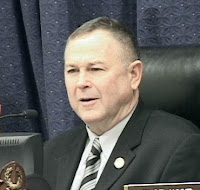 The subcommittee's Ranking Member, Dana Rohrabacher (R-CA), called for Iraqi refugees to return to their country and for the U.S. government to provide assistance only for return transportation. However, as EPIC has chronicled, conditions in Iraq are not currently safe enough for returns to be encouraged.
The subcommittee's Ranking Member, Dana Rohrabacher (R-CA), called for Iraqi refugees to return to their country and for the U.S. government to provide assistance only for return transportation. However, as EPIC has chronicled, conditions in Iraq are not currently safe enough for returns to be encouraged.
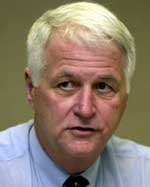 Meanwhile, IOHRO Chairman Rep. Bill Delahunt (D-MA) respectfully called Rohrabacher mistaken, and emphasized that the U.S. “owns” this problem. Delahunt called for the US to address the crisis to improve our image in the Middle East, prevent the refugee population for becoming a “breeding ground for terrorists” and to respond robustly to UN humanitarian appeals. From the Washington Post:
Meanwhile, IOHRO Chairman Rep. Bill Delahunt (D-MA) respectfully called Rohrabacher mistaken, and emphasized that the U.S. “owns” this problem. Delahunt called for the US to address the crisis to improve our image in the Middle East, prevent the refugee population for becoming a “breeding ground for terrorists” and to respond robustly to UN humanitarian appeals. From the Washington Post:
 MESA Chairman Rep. Gary L. Ackerman (D-NY), who called the hearing, opened by looking back at the administration’s inaction in assisting Iraqis who helped the U.S. "I can't remember President Bush speaking about this refugee crisis or the need for the United States to respond aggressively to it except in passing," Ackerman pointed out.
MESA Chairman Rep. Gary L. Ackerman (D-NY), who called the hearing, opened by looking back at the administration’s inaction in assisting Iraqis who helped the U.S. "I can't remember President Bush speaking about this refugee crisis or the need for the United States to respond aggressively to it except in passing," Ackerman pointed out.Indeed, EPIC has long criticized the President for his silence on this issue. Although Congress has made some progress in providing $150 million in FY07 supplemental funding, 5,000 Special Immigrant Visas (SIVs) and expanding eligibility for resettlement programs, this isn't even a dent in a crisis costing billions and involving millions. The administration's failure to so much as acknowledge the problem in public discourse is reprehensible.
 The subcommittee's Ranking Member, Dana Rohrabacher (R-CA), called for Iraqi refugees to return to their country and for the U.S. government to provide assistance only for return transportation. However, as EPIC has chronicled, conditions in Iraq are not currently safe enough for returns to be encouraged.
The subcommittee's Ranking Member, Dana Rohrabacher (R-CA), called for Iraqi refugees to return to their country and for the U.S. government to provide assistance only for return transportation. However, as EPIC has chronicled, conditions in Iraq are not currently safe enough for returns to be encouraged. Meanwhile, IOHRO Chairman Rep. Bill Delahunt (D-MA) respectfully called Rohrabacher mistaken, and emphasized that the U.S. “owns” this problem. Delahunt called for the US to address the crisis to improve our image in the Middle East, prevent the refugee population for becoming a “breeding ground for terrorists” and to respond robustly to UN humanitarian appeals. From the Washington Post:
Meanwhile, IOHRO Chairman Rep. Bill Delahunt (D-MA) respectfully called Rohrabacher mistaken, and emphasized that the U.S. “owns” this problem. Delahunt called for the US to address the crisis to improve our image in the Middle East, prevent the refugee population for becoming a “breeding ground for terrorists” and to respond robustly to UN humanitarian appeals. From the Washington Post: Rep. Delahunt said the Bush administration and Congress have "a moral responsibility" to provide $500 million next year for food and financial support for the refugees because "we cannot deny that the proximate cause of this human tragedy is the invasion of Iraq and its aftermath."“We’ve helped to create a mess,” Ackerman said. “At best we should help clean up our mess; we owe it to these people if nothing else.” To take action and encourage YOUR members of Congress to continue this important discussion and do more for Iraqis in need, please check out our Iraq Forum and Advocacy Days in April.
He said the United States cannot afford to ignore the refugee situation, as it did in Afghanistan after the defeat of the Soviet Union, because "these vast numbers of refugees will produce the terrorists of the future unless they are treated in a way that is respectful and dignified and humanitarian."
Delahunt criticized the State Department for not pushing the Baghdad government to contribute more to neighboring countries, where 2.5 million Iraqi refugees have fled. He said it is "embarrassing" that Washington could not persuade the government of Nouri al-Maliki to offer more than $25 million to support its own citizens in Syria and Jordan. Ten months later, some of the money has not been delivered, he said.
Thursday, March 13, 2008
EPIC Wants YOU to Come to DC!!!
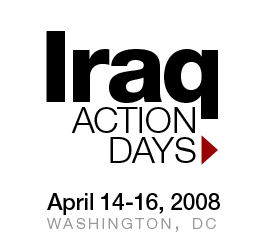 Get your voice heard!
Get your voice heard!The Education for Peace in Iraq Center (EPIC) is proud to announce our upcoming Iraq Action Days, April 14-16, an opportunity for supporters to come together in Washington, DC to promote genuine peace and relief for the people of Iraq.
On Monday, April 14th, the Institute for Middle East Studies at George Washington University is hosting a major policy forum on the Humanitarian Crisis Facing Iraqis, sponsored by EPIC and a "who's who" of aid agencies including Refugees International, Mercy Corps, International Rescue Committee, and Church World Service. Then on Tuesday, April 15th, and Wednesday, April 16th, we will meet with our lawmakers -- YOUR representatives! -- to urge them to do more to address urgent humanitarian needs in Iraq and the region.
To register for the event, click here. We need lots of people in order to make an impression, and we need YOU in order to reach your representatives in Congress. This is your chance to make sure, in person, that your government is working for you!
 If you don't have the three days to spare in April, please consider showing your support for the Iraqi people through a donation to the event through EPIC. Even a small amount will make a difference in our work.
If you don't have the three days to spare in April, please consider showing your support for the Iraqi people through a donation to the event through EPIC. Even a small amount will make a difference in our work.Until there is an end to the urgent humanitarian crisis in Iraq, our momentum and constituent pressure must continue to grow. Now more than ever the Iraqi people need our vital advocacy and support. Please register now to come to Washington, DC and join us in this much needed effort.
Wednesday, March 12, 2008
Headlines 3/12/08
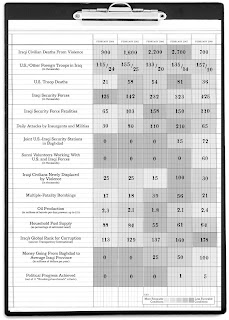 FACTBOX: Challenges facing Iraq 5 years after U.S. invasion
FACTBOX: Challenges facing Iraq 5 years after U.S. invasionReuters
March 11, 2008
Following are some of the challenges Iraqi Shi'ite Prime Minister Nuri al-Maliki faces, five years after the U.S.-led invasion toppled Saddam Hussein.
Keeping Iraq in the Dark
New York Times (op-ed)
March 11, 2008
LACK of electricity is still a big problem in Iraq, and there’s lots of blame to go around. Much of it goes to the usual suspects: too many insurgent attacks, too few experienced engineers and technicians. But there’s another factor, big and getting bigger, which you probably haven’t read about. It’s one that Prime Minister Nuri al-Maliki and his bureaucrats could solve quickly, if they wanted to: Iraq’s Ministries of Oil and Electricity are at loggerheads.
The State of Iraq: An Update
New York Times
March 9, 2008
IRAQ’S security turnaround has continued through the winter. The question for 2008 is whether Iraqi security forces can preserve and build on this improvement as they increasingly bear more of the responsibility as the number of American troops declines (and as refugees and internally displaced Iraqis try to return to their homes).
Women bear brunt of Iraq bloodshed
Associated Free Press
March 8, 2008
"There was a stranger at the door. He gave me an envelope which had two bullets and a letter that said 'if you do not close your beauty parlour, we will kill you. Your work is haram (forbidden),'" says Asma Kadhim, 40, one of the thousands of Iraqi women facing the brunt of daily bloodshed.
Iraqis who fled war are still stalked by mental distress
Lebanon Daily Star
March 6, 2008
Iraqi refugees in Lebanon are suffering from high levels of emotional and psychological distress, said a study released this week by the International Organization for Migration (IOM) aimed at assessing the mental health and psychosocial needs of Iraqi refugees in Lebanon and Jordan.
Jobs needed or Iraq troop pullout at risk
Reuters
March 5, 2008
The United States may be forced to halt planned troop withdrawals from Iraq unless Iraqi authorities move faster to create jobs and improve basic services, a top U.S. general said on Wednesday.
Tuesday, March 11, 2008
"You have made a big hole, and put our lives into it."
 At left is a picture I took of the Jordanian Red Crescent medical facilities serving Iraqi refugees in East Amman, Jordan, where I visited with a small group of colleagues in late February.
At left is a picture I took of the Jordanian Red Crescent medical facilities serving Iraqi refugees in East Amman, Jordan, where I visited with a small group of colleagues in late February.What this picture doesn't show are the 50 or so refugees, mostly women and children, packed like sardines in the waiting room, or the dozens more lined up outside. It doesn't show them waiting hours and then more hours, hoping that maybe today they will see a doctor. It doesn't show the smell, the hopelessness, the kids looking up at their mothers expectantly, the mothers wondering where their next meal is coming from. The two doctors staffing this facility have seen up to 250 patients a day, 6,000 patients a month. For their safety, I couldn't take pictures of the refugees in and around the clinic.
This picture doesn't show the equipment the doctors need, but don't have. This room, this is it. Iraqi refugees are believed to have extremely high rates of chronic diseases such as cancer, diabetes and heart disease, owing to their increasing levels of stress and inability to afford decent food. Yet this clinic has no X-rays, no blood-glucose meters, no equipment for radiation or chemotherapy, and very little medication. Just a crude heart monitor, a small oxygen tank and one of those arm bands for taking blood pressure. The doctors find they can do very little for many of the patients who come in.
The picture doesn't show the thousands of refugees who are sick, but too scared to come in for treatment because they might be seen -- "if someone is looking for me, they will look in the places where Iraqis are." And despite the Jordanian government's claim that it only deports refugees if they pose an immediate threat to national security, many Iraqis in Jordan live in fear that identifying themselves even to the Red Crescent could result in deportation. And deportation could mean death in Iraq. Many would rather be sick.
 Yet many recognize the symbol of the Red Crescent as one they can trust. The first refugee clinic in Jordan had a slow start in 2003, when no one was sure just how many refugees there would be or whether they would come in. But after about six weeks, the Red Crescent had to open up three more clinics in East Amman, and even then it couldn't meet the demand.
Yet many recognize the symbol of the Red Crescent as one they can trust. The first refugee clinic in Jordan had a slow start in 2003, when no one was sure just how many refugees there would be or whether they would come in. But after about six weeks, the Red Crescent had to open up three more clinics in East Amman, and even then it couldn't meet the demand.The Jordanian Red Crescent provides other services to the refugee community. They distribute blankets, food, children's supplies and hygiene packs, to help the Iraqis maintain their dignity. One of the clinics offers dentistry, for which there has been huge demand. And they have two teams of volunteers going door-to-door to collect health data and spread the word about the clinics.

 They also offer vocational training for women, including patchwork, beading, hairdressing and computers. To the left are some pictures of the training facilities at the clinic I visited. Although Iraqis can't legally work in Jordan, as many as 30% work informally, and many women take the classes because they hope to apply new skills towards rebuilding Iraq once it is stable enough to return. Many are just bored with the passive role of hiding into which they've been forced, and the classes offer a constructive use of time and opportunity to network with other women in safe space.
They also offer vocational training for women, including patchwork, beading, hairdressing and computers. To the left are some pictures of the training facilities at the clinic I visited. Although Iraqis can't legally work in Jordan, as many as 30% work informally, and many women take the classes because they hope to apply new skills towards rebuilding Iraq once it is stable enough to return. Many are just bored with the passive role of hiding into which they've been forced, and the classes offer a constructive use of time and opportunity to network with other women in safe space.But this well-meaning organization faces many constraints. They lack solid data, since studies to date have been unable to coax many Iraqis out of hiding and those who do answer are suffering from "survey fatigue." Without data, the Red Crescent has a hard time soliciting funding. Meanwhile, the numbers and needs of the refugee population are increasing, especially in terms of pre- and post-natal care and mental health. As many as 80% of Iraqi refugees in Jordan have some form of mental illness, from situation-induced anxiety disorders and depression to more serious conditions caused by trauma they endured in Iraq.
As our group left the clinic, an Iraqi woman tugged on my sleeve and said something in Arabic. I looked at her blankly, ashamed that my Arabic wasn't strong enough to comprehend. She merely shook her head and said, in perfect English, "you don't understand what I am saying."
Later, I asked someone what she had said in Arabic. "You have made a big hole, and put our lives into it," my friend translated roughly. The woman must have known we were Americans.
Our group made a small donation to the Red Crescent as part of our time in Jordan. It wasn't much, but enough to pay the doctors' salaries for three months. To learn more about their programs and support the Jordanian Red Crescent, please visit their website.
Extraordinary Lives: Oxfam Commemorates Iraqi Women
What are you doing today? What would you be doing if you lost your home... your family... your income? This is the daily reality facing a huge number of women living in today's Iraq.
![Huda makes bread for her neighbors in exchange for flour. [Photo: Oxfam]](//2.bp.blogspot.com/_2-Ct1a3ucJI/R9apvDTdgWI/AAAAAAAAAL4/mL6bD6_xn_U/s200/hudamakesbread.jpg) Around 82 percent of the 2.4 million people displaced inside Iraq are women, or young children under the age of 12. The following stories, collected by women’s organizations in Iraq, give a rare insight into how Iraqi women are trying to help their families survive, and retain their dignity in times of extreme suffering.
Around 82 percent of the 2.4 million people displaced inside Iraq are women, or young children under the age of 12. The following stories, collected by women’s organizations in Iraq, give a rare insight into how Iraqi women are trying to help their families survive, and retain their dignity in times of extreme suffering.
Shukriya's story
Shukriya collects drinks cans and nylon to sell to factories to make small amounts of money for her family to survive.
Three women in Baghdad
"As mothers we are the source of calmness and affection for our children. We have to hide our emotions, keep them to ourselves so that our kids do not feel afraid or worried."
Huda's story
Widowed, and living in an area with no job prospects, it is up to Huda to single-handedly look after her family – a seemingly impossible task.
Basima's story
Since the war, Basima, 60, works all day to provide food and warmth for her two grandchildren.
Click the links or visit Oxfam International for the full stories.
![Huda makes bread for her neighbors in exchange for flour. [Photo: Oxfam]](http://2.bp.blogspot.com/_2-Ct1a3ucJI/R9apvDTdgWI/AAAAAAAAAL4/mL6bD6_xn_U/s200/hudamakesbread.jpg) Around 82 percent of the 2.4 million people displaced inside Iraq are women, or young children under the age of 12. The following stories, collected by women’s organizations in Iraq, give a rare insight into how Iraqi women are trying to help their families survive, and retain their dignity in times of extreme suffering.
Around 82 percent of the 2.4 million people displaced inside Iraq are women, or young children under the age of 12. The following stories, collected by women’s organizations in Iraq, give a rare insight into how Iraqi women are trying to help their families survive, and retain their dignity in times of extreme suffering.Shukriya's story
Shukriya collects drinks cans and nylon to sell to factories to make small amounts of money for her family to survive.
Three women in Baghdad
"As mothers we are the source of calmness and affection for our children. We have to hide our emotions, keep them to ourselves so that our kids do not feel afraid or worried."
Huda's story
Widowed, and living in an area with no job prospects, it is up to Huda to single-handedly look after her family – a seemingly impossible task.
Basima's story
Since the war, Basima, 60, works all day to provide food and warmth for her two grandchildren.
Click the links or visit Oxfam International for the full stories.
Wednesday, March 05, 2008
Headlines 3/5/08
ACT: Iraqi refugees who leave homes for the safety of Syria still face challenges
Reuters
March 5, 2008
In the predominantly Shi'ite Set Zeinab section of Damascus lives an Iraqi tailor who spends his days making women's head coverings. Middle-aged Kazin explains to visitors that the light colored cotton fabric he uses is suitable for his poor eyesight, a result of the torture he suffered when he was a prisoner during the Saddam years.
Iraqi Refugees in Lebanon, Jordan under Psychological Distress
Associated Press
March 5, 2008
Large numbers of Iraqi refugees are experiencing psychological distress including panic attacks and problems sleeping, a study by the International Organization for Migration said Tuesday.
Commander in Mideast says decreased violence in Iraq not irreversible
ABC News
March 4, 2008
Admiral William Fallon tells a Senate committee there's been a dramatic drop in violence in Iraq. But he warns that the threat of extremism remains high and that ground gained in Iraq can still be lost.
UNHCR second rapid assessment of return of Iraqis from displacement locations in Iraq and from neighbouring countries
United Nations High Commissioner for Refugees
March 4, 2008
UNHCR has clear criteria for promotion of returns and those criteria are not met by the current situation in Iraq. Therefore, UNHCR is not promoting returns to Iraq in the present circumstances because UNHCR does not believe the conditions are there to enable return in full safety and dignity on a meaningful scale.
Iraqi Refugees: Living in Limbo
Christian Relief Services
March 4, 2008
"We had to flee Iraq because of the violence," the father of four began. "One day while I was at work, my wife was confronted by militia members with a warning: get out or you will be killed." He explained that he'd been targeted after reporting that a Shia sect's militia had planted bombs on the side of a nearby road.
Violence Leaves Young Iraqis Doubting Clerics
New York Times
March 4, 2008
After almost five years of war, many young people in Iraq, exhausted by constant firsthand exposure to the violence of religious extremism, say they have grown disillusioned with religious leaders and skeptical of the faith that they preach.
U.S. slow to admit refugees
Associated Press
March 2, 2008
The number of Iraqi refugees admitted to the United States rose slightly for the second month in a row, although the Bush administration still will struggle to meet its target of 12,000 by the end of September.
Guards to resume patrols in key Iraq province
Reuters
March 1, 2008
Tribal security guards patrolling one of Iraq's most dangerous provinces agreed to return to work on Saturday after a three-week strike, one of their leaders and the U.S. military said.
Despite Problems, Iraqi Leader Boasts of Success
Washington Post
February 29, 2008
"We promised we would bring national reconciliation to the sons of Iraq, and we have succeeded!" Maliki thundered to hundreds of thousands of Shiites gathered at the golden-domed Imam Hussein Shrine in Karbala. "Iraqis are once again loving brothers!"
Sunni forces losing patience with U.S.
Washington Post
February 28, 2008
U.S.-backed Sunni volunteer forces, which have played a vital role in reducing violence in Iraq, are increasingly frustrated with the American military and the Iraqi government over what they see as a lack of recognition of their growing political clout and insufficient U.S. support.
Shiite pilgrims flock to Iraq shrine city
Associated Press
February 27, 2008
Amid tight security, millions of Shiite pilgrims flocked Wednesday to the Iraqi shrine city of Karbala for Arbaeen, one of the holiest ceremonies in the Shiite calendar which was largely suppressed during the iron-fisted rule of Saddam Hussein.
Iraq presidency rejects provincial election law
Associated Press
February 27, 2008
Iraq's three-member presidency council has rejected a draft law to hold provincial elections and returned it to parliament, the president's office said on Wednesday.
UN Urges Iraq, US to Help With Refugees
Associated Press
February 27, 2008
A top U.N. refugee official warned on Tuesday of the possibility that Iraqi refugees might be expelled from their sanctuaries unless the United States, Iraq and other countries act quickly to help them.
Reuters
March 5, 2008
In the predominantly Shi'ite Set Zeinab section of Damascus lives an Iraqi tailor who spends his days making women's head coverings. Middle-aged Kazin explains to visitors that the light colored cotton fabric he uses is suitable for his poor eyesight, a result of the torture he suffered when he was a prisoner during the Saddam years.
Iraqi Refugees in Lebanon, Jordan under Psychological Distress
Associated Press
March 5, 2008
Large numbers of Iraqi refugees are experiencing psychological distress including panic attacks and problems sleeping, a study by the International Organization for Migration said Tuesday.
Commander in Mideast says decreased violence in Iraq not irreversible
ABC News
March 4, 2008
Admiral William Fallon tells a Senate committee there's been a dramatic drop in violence in Iraq. But he warns that the threat of extremism remains high and that ground gained in Iraq can still be lost.
UNHCR second rapid assessment of return of Iraqis from displacement locations in Iraq and from neighbouring countries
United Nations High Commissioner for Refugees
March 4, 2008
UNHCR has clear criteria for promotion of returns and those criteria are not met by the current situation in Iraq. Therefore, UNHCR is not promoting returns to Iraq in the present circumstances because UNHCR does not believe the conditions are there to enable return in full safety and dignity on a meaningful scale.
Iraqi Refugees: Living in Limbo
Christian Relief Services
March 4, 2008
"We had to flee Iraq because of the violence," the father of four began. "One day while I was at work, my wife was confronted by militia members with a warning: get out or you will be killed." He explained that he'd been targeted after reporting that a Shia sect's militia had planted bombs on the side of a nearby road.
Violence Leaves Young Iraqis Doubting Clerics
New York Times
March 4, 2008
After almost five years of war, many young people in Iraq, exhausted by constant firsthand exposure to the violence of religious extremism, say they have grown disillusioned with religious leaders and skeptical of the faith that they preach.
U.S. slow to admit refugees
Associated Press
March 2, 2008
The number of Iraqi refugees admitted to the United States rose slightly for the second month in a row, although the Bush administration still will struggle to meet its target of 12,000 by the end of September.
Guards to resume patrols in key Iraq province
Reuters
March 1, 2008
Tribal security guards patrolling one of Iraq's most dangerous provinces agreed to return to work on Saturday after a three-week strike, one of their leaders and the U.S. military said.
Despite Problems, Iraqi Leader Boasts of Success
Washington Post
February 29, 2008
"We promised we would bring national reconciliation to the sons of Iraq, and we have succeeded!" Maliki thundered to hundreds of thousands of Shiites gathered at the golden-domed Imam Hussein Shrine in Karbala. "Iraqis are once again loving brothers!"
Sunni forces losing patience with U.S.
Washington Post
February 28, 2008
U.S.-backed Sunni volunteer forces, which have played a vital role in reducing violence in Iraq, are increasingly frustrated with the American military and the Iraqi government over what they see as a lack of recognition of their growing political clout and insufficient U.S. support.
Shiite pilgrims flock to Iraq shrine city
Associated Press
February 27, 2008
Amid tight security, millions of Shiite pilgrims flocked Wednesday to the Iraqi shrine city of Karbala for Arbaeen, one of the holiest ceremonies in the Shiite calendar which was largely suppressed during the iron-fisted rule of Saddam Hussein.
Iraq presidency rejects provincial election law
Associated Press
February 27, 2008
Iraq's three-member presidency council has rejected a draft law to hold provincial elections and returned it to parliament, the president's office said on Wednesday.
UN Urges Iraq, US to Help With Refugees
Associated Press
February 27, 2008
A top U.N. refugee official warned on Tuesday of the possibility that Iraqi refugees might be expelled from their sanctuaries unless the United States, Iraq and other countries act quickly to help them.
Subscribe to:
Posts (Atom)